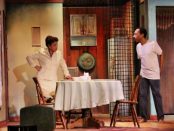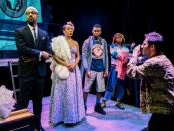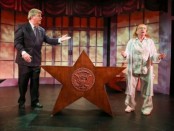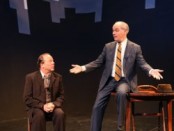Two Can Play
However, it’s not until the second act that the play generates many laughs. Here, the tables turn on Jim. Gloria, returning to Kingston, has gained self-assurance from her escapades in the states, and she is ready to lay down the law in search of some R-E-S-P-E-C-T from her husband—or, rather, her ex-husband. Interestingly, what she has seen of the U.S. hasn’t impressed her. She doesn’t exactly refuse to follow through with the original plan that she and Jim had hatched, but she doesn’t promise anything. The fact that she is now legally American herself, and no longer Jim’s chattel, has given her both power and initiative. She even begins taking night courses to train as a nurse, so that she can do something more than scrub white Americans’ floors if and when the immigration happens. [more]






